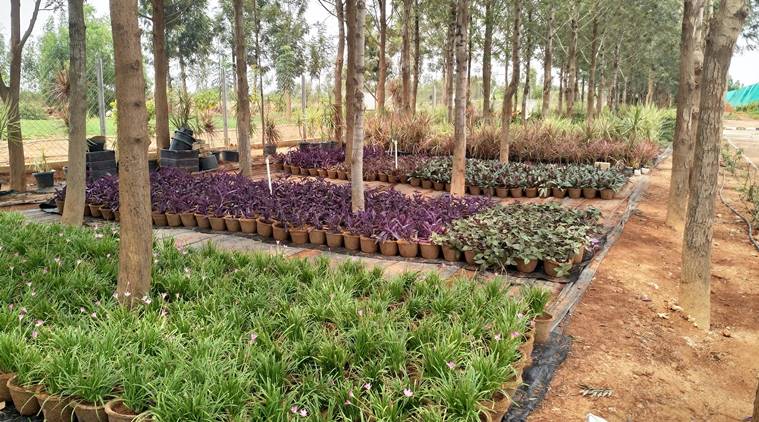 As per the revised rates, the plants (six months to one year of age) raised in 12×22 cm polybags will now be available at the rate of Rs 15 per plant in place of previous charges of just Rs 1 per plant.
As per the revised rates, the plants (six months to one year of age) raised in 12×22 cm polybags will now be available at the rate of Rs 15 per plant in place of previous charges of just Rs 1 per plant.
Haryana government’s decision to increase charges of saplings/plants has come under fire from environmentalists, who claim that it will hit the state’s plans to increase its forest cover. The government, however, has insisted that they have just hiked the cost of plants following an increase in the labour engaged in raising the plants in nurseries. The government also says that most of the plants for plantation drives are supplied free of cost.
As per the revised rates, the plants (six months to one year of age) raised in 12×22 cm polybags will now be available at the rate of Rs 15 per plant in place of previous charges of just Rs 1 per plant. The plants of more than five feet height raised in 30x45cm size bags can be purchased at the rate of Rs 80 per plant instead of Rs 25 per plant.
The cost of ETP (erect tall plant) poplar has been revised to Rs 25 per plant instead of previous rate of Rs 10 per plant while clonal eucalyptus rates have been increased to Rs 10 per plant from previous Rs eight per plant.
The new rates were fixed in May this year, but the activists have come to know about the development recently amid the plantation drives which will continue till September.
In a letter addressed to the forest officers in the field on May 14, the Principal Chief Conservator of Forests (PCCF) mentioned: “The new rates have been fixed because of increase in the cost following hike in the wages of labour.”
A senior officer in the Forest Department said: “We revise the nursery cost price of plants depending upon various calculations as the wages of the labour are increased twice in a year apart from increase in the material cost. We don’t have any targets to sell the plants. But if anybody wants to purchase, then we charge the cost of the plants.”
Objecting the hike in the charges of plants, Shivalik Vikas Manch president Vijay Bansal termed the move as “anti-farmer and anti-environment.”
In a letter to the Chief Minister, Bansal has demanded to provide plants to the farmers and social activists free of cost. Echoing similar sentiments Bhartiya Kisan Union president Gurnam Singh Chaduni said, “With the enhanced cost of plants, the farmers have to incur an extra expenditure of Rs 3,000 per acre only on account of purchasing poplar plants. On the one hand, the government claims to be concerned about the environment while at the same time the prices of poplar and clonal eucalyptus have been increased.”
Chaduni added: “To save the environment and stop depleting water levels, the government should offer Rs 10,000 per acre as an incentive to those farmers who opt for farming of eucalyptus and clonal poplar.” Haryana Environmental Society president Professor S L Saini also said the hike in the prices of plants was not justified.
However, Principal Chief Conservator of Forests (Wildlife) Alok Verma said, “Poplar and clonal eucalyptus are commercial crops to make money out of it. If you want them, you have to purchase the plants. Now, we have increased the targets of plants which are provided free of cost. But if somebody wants to buy bigger plants in bigger polybags, then they will have to pay the cost price.”
Officials said that the number of plants which are purchased from government nurseries is very small in comparison to those which are provided free of cost to village panchayats, schools and other bodies. The cost of such plants is borne by the government.
According to officials, the hike in price of plants is because the subsidy has been removed for sale of some plants adding “sometime these plants are given at subsidized rates under various governmental schemes”. They added that the rates of plants raised in private nurseries are much higher than of the government nurseries.
Around 6.8 per cent of total area in Haryana is under forest and tree cover. Haryana Forest and Environment Minister Kanwar Pal Gujjar had earlier stated the Forest Department has set a target of increasing the forest area in the state by 7 to 20 per cent, under which about 1.25 crore saplings will be planted this year.
“‘COVID Vatika’ will be set up in 1100 villages of the state in which medicinal plants will be planted. Among the 1.25 crore saplings to be planted by the forest department, the goal is to plant more fruit saplings. These saplings will be planted in schools, colleges, religious places, roadsides and on panchayati land.” According to Gujjar, ‘Vrikshamitra’ will be appointed to take care of these plants so that 100 percent plants can survive.